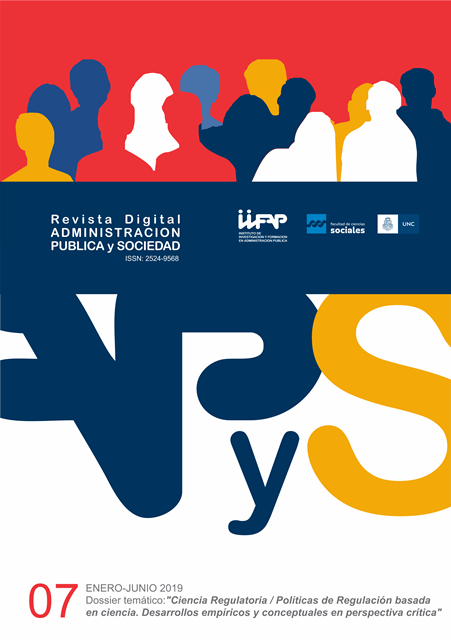La innovación tecnológica en la constitución de Brasil
Conteúdo do artigo principal
Resumo
El artículo analiza las medidas públicas de promoción de lainnovación tecnológica en la Constitución federal de Brasil, a partir de la enmienda constitucional n°85. El estudio se lleva a cabo con un enfoque crítico de la legitimidad del Derecho y del actuar del Estado a la luz de los mandatos constitucionales. Elobjetivo es determinar, a partir del principio democrático y otros dispositivos constitucionales, las actitudes que el Estado debe asumir desde su rol colaborador previsto en la Constitución federal, con relación a la innovación tecnológica, para la satisfacción del bien común. Se estudian aspectos vinculados al rol del Estado en la economía de mercado, en el marco del desarrollo tecnológico actual con relación a los derechos fundamentales.
Detalhes do artigo
Edição
Seção

Este trabalho está licenciado sob uma licença Creative Commons Attribution-NonCommercial-ShareAlike 4.0 International License.
Los autores/as que publiquen en esta revista, aceptan los siguientes términos de la política de derechos de autor:- Los autores/as conservarán sus derechos de autor (esto incluye el copyrigth) y garantizarán a la revista el derecho de primera publicación de su obra, el cuál estará simultáneamente sujeto a la Licencia de reconocimiento de Creative Commons: No se permite un uso comercial de la obra original ni de las posibles obras derivadas, la distribución de las cuales se debe hacer con una licencia igual a la que regula la obra original.
- Los autores/as podrán adoptar otros acuerdos de licencia no exclusiva de distribución de la versión de la obra publicada (p. ej.: situarlo en un repositorio institucional o publicarla en un libro) siempre que se indique la publicación inicial en esta revista.
- Se permite y recomienda a los autores/as difundir su obra a través de Internet (p. ej.: en repositorios institucionales o en su página web) luego del proceso de publicación, lo cual puede producir intercambios interesantes y aumentar las citas de la obra publicada. (Véase El efecto del acceso abierto).
Como Citar
Referências
ARAGÓN, Manuel (1998). La eficacia jurídica del principio democrático. En Revista Española de Derecho Constitucional, 24, pp.9-45.
ATIENZA, Manuel (2012). El sentido del Derecho. Madrid: Planeta.
BETANCOR, André (2001). Instituciones de Derecho Ambiental. Madrid: La Ley.
BOURDIEU, Pierre (2012). Sobre o Estado. São Paulo: Companhia das Letras.
CUPANI, Alberto (2011). Filosofia da tecnologia: um convite. Florianópolis: UFSC.
DEL VECHIO, Angelo (2017). Sistema Nacional de Ciência, Tecnologia e Inovacao e a pesquisa na universidade brasileira: implicações geopolíticas. Laplage. Revista (Sorocaba), 3, 3, pp.133-146
EIZAGIRRE, Andoni (2016). La constitución de las políticas de investigación e innovación responsables: tensiones en la instrumentalización y la regulación. En Politica y Sociedad, 53, pp. 815-836.
ENGELMANN, Wilson (2015) En búsqueda de modelos jurídicos para generar informaciones sobre los (posibles) riesgos originados de la escala manométrica. En Narciso LeandroXavier Baez; Vinicius Almada Mozetic; Nuria Belloso Martin; Helena Nadal Sánchez (Comps.), O impacto das novas tecnologias nos direitos fundamentais. Joacaba: UNOESC, pp. 399-424.
ESTEVE PARDO, José (2013). La nueva relación entre Estado y sociedad. Aproximación al trasfondo de la crisis. Madrid: Marcial Pons.
FERRAJOLI, Luigi (2015) A democracia através dos direitos. O constitucionalismo garantista como modelo teórico e como projeto político. São Paulo: Thomson Reuters, Revista dos Tribunais.
HESSE, Konrad (2011). Escritos de Derecho Constitucional. Madrid: Fundación coloquio jurídico europeo. Centro de estudios políticos y constitucionales.
LOPES QUEIROZ, José E. y BATISTA DOS SANTOS Márcia (2006). A socialização da economia. En José Martins Cardozo; Joao Eduardo Lopes Queiroz; Márcia Walquíria Batista dos Santos. Curso de Direito Administrativo Económico. São Paulo: Malheiros Editores.
MARTÍN MATEO, Ramón (2003). El marco público de la economía de mercado. Navarra: Aranzadi.
NINO, Carlos (2007). Ética y derechos humanos. Un ensayo de fundamentación. Buenos Aires: Astrea.
SAMANIEGO, Pablo (2018). Hacia uma política pública del bioconocimiento: ciencia, tecnología e investigación. En Universitas, 29, pp.89-108.
SEVERO ROCHA, Leonel (2005). Epistemologia jurídica e democracia. São Leopoldo: Unisinos.
UNESCO (2015) Informe de la Unesco sobre Ciencia, hacia el 2030. En http://unesdoc.unesco.org/images/0023/002354/235407s.pdf. Acceso en 12.04.2019.
VERNENGO, Roberto (1992). Legalidad y legitimidad: los fundamentos morales del Derecho. En Revista de Estudios Políticos (Nueva Época), 77, pp. 267-284.

